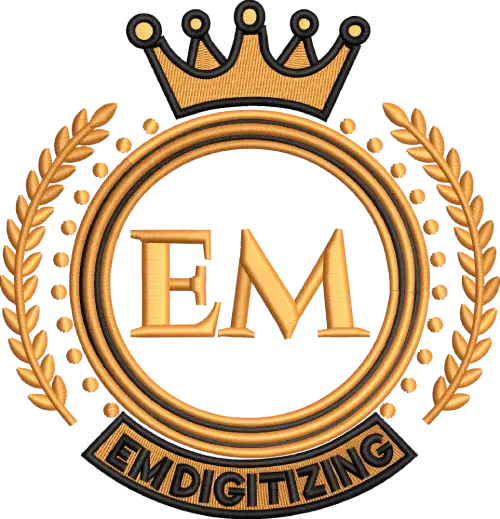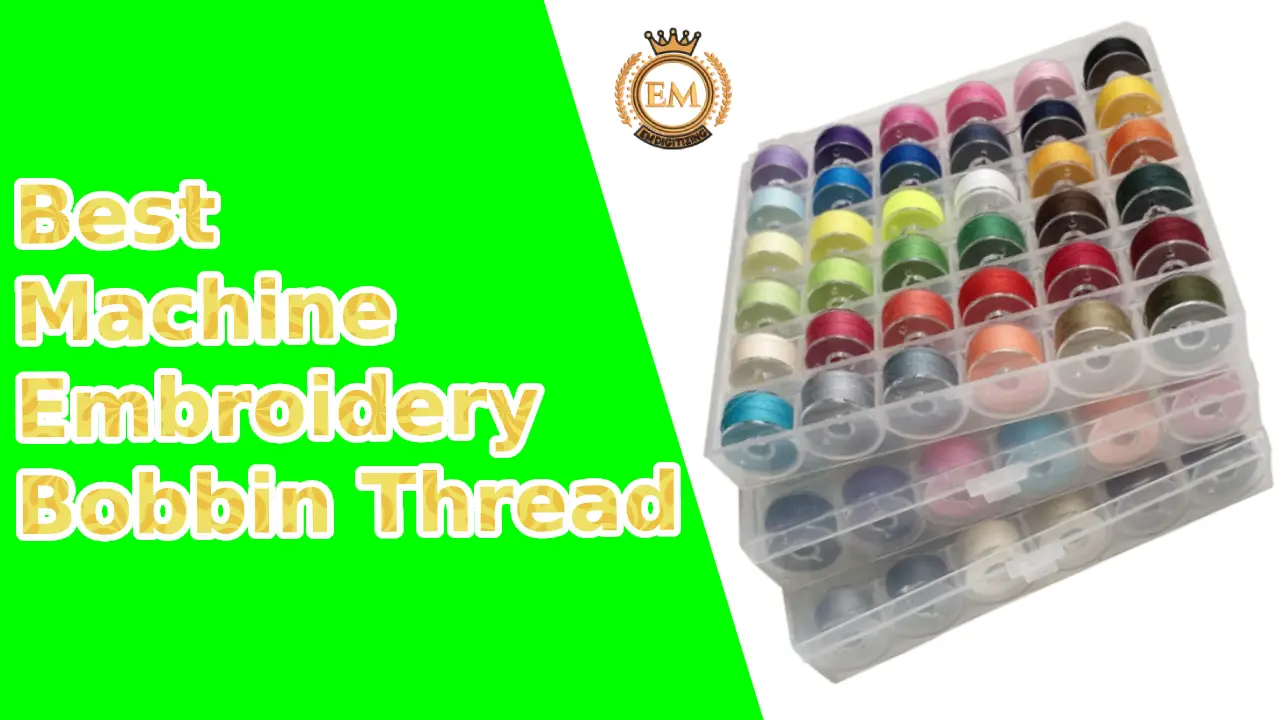
Using the wrong embroidered bobbin thread in your embroidery machine can cause thread breakage, loose stitches, and even stress problems. And a frustrating aspect for beginners is the machine manual (well, at least mine) lacks in-depth details about the compatible machine embroidery bobbin thread.
What Is Machine Embroidery Bobbin Thread?
Machine embroidery bobbin thread is different from the ordinary thread. First of all, it’s very thin. Normally, it weighs 60 or 90, while standard embroidered yarn usually weighs 40. And, the overweight number means a thin thread.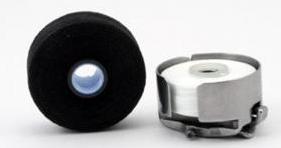
It is also usually made of polyester monofilament. This means that it is a long strand, rather than twisting multiple edges together like a regular thread. It usually has fewer turns per inch, making it smoother and easier to embroider.
Another difference is that machine embroidered bobbin thread usually only comes in white. So, save your money by investing in a great combination of machine embroidery thread colors, because you will only need colored bobbin thread white!
Embroidery Digitizing Services
Choose the Best Machine Embroidery Bobbin Thread
Your user manual is the best place to find out which bobbin thread to use for your embroidery machine.
However, bobbin threads vary in weight, quality, color, and fiber composition, and you may need some additional information.
Thus, there is a quick discussion about the different types of bobbin threads and choosing the right type for your embroidery machine.
Bobbin Thread Fiber Composition
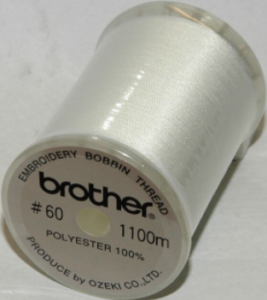 The most popular types of embroidered thread fibers for top thread spools are raven, polyester, and cotton. The same is true for bobbins, and as with regular embroidery threads, the method of making bobbin threads may vary.
The most popular types of embroidered thread fibers for top thread spools are raven, polyester, and cotton. The same is true for bobbins, and as with regular embroidery threads, the method of making bobbin threads may vary.
The most important part of choosing a bobbin thread is to choose one that says it is made specifically for the bobbin of the embroidery machine.
For my machines, I prefer polyester bobbin thread. However, I use cotton embroidered bobbin thread (harder than polyester) for items that have to go in the oven or microwave because the heat is not polyester or raven friendly.
Bobbin Thread Colors
Imagine a design with 30 color variations. Do you need to change the bobbin thread 30 times to match?
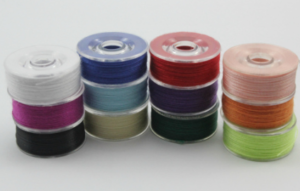 Thankfully, the answer is no! This is because the embroidery design is digitized so the bobbin thread will not be visible on the empty part of the embroidery.
Thankfully, the answer is no! This is because the embroidery design is digitized so the bobbin thread will not be visible on the empty part of the embroidery.
There is no need to pay attention to the colors of the bobbin thread until the back of the design is visible.
In fact, embroidered bobbin threads come in only a few colors (often black and white, although Madeira has multi-colored bobbins). Therefore, you are limited in what you can wrap using the original bobbin thread anyway.
Choose Bobbin Thread Weight
Bobbin Thread weight refers to the width of the embroidery thread. A large number of weights belong to the thin thread.
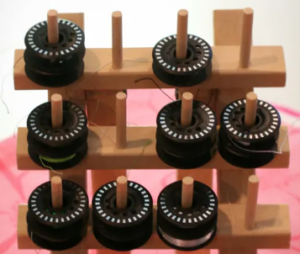 Unlike sewing, where you usually connect the bobbin thread to the top thread, the bobbin thread is better than the top thread for the embroidery machine.
Unlike sewing, where you usually connect the bobbin thread to the top thread, the bobbin thread is better than the top thread for the embroidery machine.
One reason for this thin bottom thread is to prevent dense designs from bulking too many threads at the bottom of the design, which can affect the way the design looks and is laid.
Many embroidery designs are digitized for standard 40-weight embroidery thread. The weight of the bobbin thread thus recommended is almost always 60 kg or more.
For all the Brother Embroidery machines I have (Brother SE625, SE1900, and Luminaire XP2), the recommended bobbin thread is a 60Wt thread. Some other embroidery machines use 90-weight threads, so check your user manual for the preferred weight.
Brands of Bobbin Thread
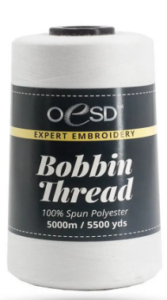 The embroidered bobbin thread is sometimes called bobbin fill or bobbin fill thread.
The embroidered bobbin thread is sometimes called bobbin fill or bobbin fill thread.
And, the largest embroidery makers make a version of the embroidered bobbin thread.
For example, Dime, Sulky, Madeira, Mettler, Aurifil, OESD, Robison Anton, and even Brother have their own bobbin threads to wrap themselves around. Fiber, thread construction methods, and weights vary.
Of course, you can also buy cheap pre-wound bobbins from Amazon, although the quality may vary. Some machine brands suggest a specific thread brand, but I’ve found that my brother’s embroidery machines accept multiple brands.
Checking Bobbin Thread Quality
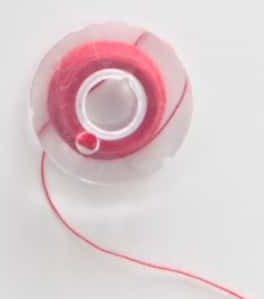 Above is an example of a vague pre-wind bobbin. It’s a beast to clean up after, and I don’t recommend using it!
Above is an example of a vague pre-wind bobbin. It’s a beast to clean up after, and I don’t recommend using it!
Unless you like to clean lint from your embroidery machine bobbin box, choose a good quality bobbin thread with minimal fibers.
The ideal thread will look thinner and will be smoother and stronger when you run your fingers over it. (However, the embroidered bobbin thread is not as strong for high-pressure seams when sewing.)
Embroidery Machine Bobbin Thread differs from The Regular Bobbin Thread
When I was taught to sew, I learned that my bobbin thread should always match the thread above me. This is because your bobbin thread is open in your sewing. If you are trying to blend your thread into the thing you are sewing, an unmatched top and bobbin thread will look different and dirty. So I will wrap a bobbin with the same thread that is with my upper thread and use it for my sewing.
However, in machine embroidery, you do not need to combine your bobbin thread with your upper thread. In fact, your goal is to have an imbalance between the thread below you and the thread above you. Keep reading and I’ll explain why.
But, first of all – let’s just thank the Lord that this is how the embroidery machine works! Can you imagine having to change the bobbin threads that you embroidered for each different color? In machine embroidery – you use the same bobbin thread for whatever you embroider. And this is a special kind of thread that is different from ordinary machine embroidery thread.
Pre-Wound Embroidery Bobbins vs. Winding Embroidery Bobbins Themselves
In my opinion, pre-blow bobbins are able to cover costs and occasional errors. Especially since they are sore and last longer than the bobbins I breathe. (My machine stops rolling in about 3/4 of the way.)
I bought a new box of 144 pre-wound bobbins about six months ago, and it’s barely half empty after about 4 million stitches since it opened. (Each bobbin takes about 50,000 stitches, I would say, although it depends on the length and type of sewing.)
When buying pre-wound bobbins, check if they are compatible with your embroidery machine (check thread weight and bobbin size) and if you need to use a special bobbin case (different from standard).
Also, most pre-wound bobbins come with plastic sides, but you can also get paper sides or a cover.
Problems With Pre-Wound Bobbins
As mentioned, the occasional Pre-Wound Bobbin problem is worth the time to save my own.
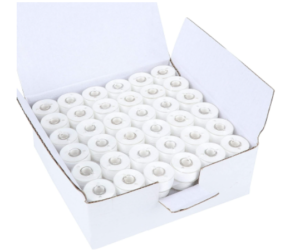
However, pre-wound bobbins are not always without problems.
- If your machine suddenly stops recognizing that the bobbin thread is running low or empty, it could be a poor quality bobbin or the wrong type of pre-wound bobbin.
- I also had problems with pre-wound bobbins that were not working with my automatic jump sewing cutter.
- The bobbin’s wound is very full. Sometimes they need to open the wound a little before it can fit in the bobbin case.
- Jump the pre-blown bobbins cab as much as possible and make a soft sound, especially when approaching the end of the bobbin.
Tips for Winding Embroidery Machine Bobbins
If you choose to roll up your bobbins, have a small army of wounded bobbins in hand before starting the project.
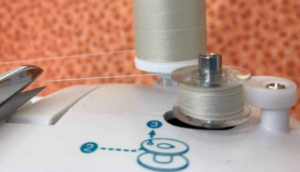 Stopping a design and blowing up a bobbin is no fun! (I toyed with the idea of an automatic, portable bobbin winder, but my new machine makes it easier to wrap the bobbin while embroidering.)
Stopping a design and blowing up a bobbin is no fun! (I toyed with the idea of an automatic, portable bobbin winder, but my new machine makes it easier to wrap the bobbin while embroidering.)
Be careful that you wrap the bobbin with equal tension. If the bobbin is tied too tightly or too loosely, you may be in trouble. Also, the thread needs to be evenly distributed along the center of the bobbin and not all are dirty on one side.
The use of slow-motion also helps in winding up, and you can catch the problems before they start. (Has anyone else ever wound the thread under the bobbin instead of the bobbin ?!)
Finally, make sure that the tail of the wound bobbin thread is cut close to the bobbin so that it does not interfere with the thread feeding later.
Conclusion
The best embroidery bobbin thread is the one that your machine maker suggests, so always check your user manual.
However, knowing these general principles for choosing embroidery bobbin threads can help you solve problems and make more than standard embroidery projects!
The bobbin thread is different from the regular embroidery thread. First of all, it’s very thin. Normally, it weighs 60 or 90, while standard embroidered yarn usually weighs 40. And, the overweight number means a thin thread.
Yes, you can use embroidery thread on the sewing machine.
In fact, there are many styles of yarn especially made for use on sewing machines. Polyester, cotton, and raven are some of these styles and you may find these threads a little stronger than ordinary embroidery threads.
A standard for all types of embroidery, it is always good to have plenty of white thread on hand. This 90-weight white bobbin thread is specially designed for fraternal embroidery machines and perfectly balances the needle thread.
Polyester or cotton bobbin thread
Both cotton and polyester are good choices for bobbin yarn and it is a matter of personal preference. Some sewing machines prefer polyester which is slightly stronger.
Threading the bobbin
Apply metal thread to your bobbin by hand. If you are using a very delicate thread, having a metal thread in the bobbin may help.
